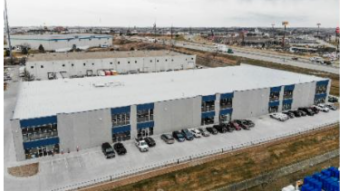REjournals recently spoke with Jeremy Jacobs, managing director and market leader for brokerage services with the Minneapolis office of Colliers International, about the resiliency of the Minneapolis/St. Paul CRE market even during the COVID-19 pandemic. Jacobs said that commercial deals are still closing in the Twin Cities. He also said that the COVID-19 threat has revealed just how strong the Twin Cities’ economy is.
Here is some of what Jacobs had to say.
Are commercial deals still getting done in the Twin
Cities market, even with the threat of COVID-19 hanging over the economy?
Jeremy Jacobs: Deals are getting done. There is no question that the
velocity of deals has decreased greatly, not unlike what the rest of the
country is experiencing. But at the same time, there is quite a bit of optimism
about the resiliency of certain sectors of the economy. There is optimism about
the ability of our local economy to emerge out of this maybe faster than other
parts of the country.
We are focusing on key areas where we might see the light switch flipped more quickly. Most people have wrapped their heads around the idea that this will be more of a U-shaped than a V-shaped recovery. The only question is how compressed the bottom of that U will be for different sectors.
It sounds, then, like you are seeing signs of hope out
there.
Jacobs: We recently completed a major transaction with CSM, the sale of a
portfolio of 57 buildings and nearly 7 million square feet. In other markets a
deal of that size at this time might have been sidelined, postponed or canceled
altogether. The fact that this deal did close here gives a good indication of
how the industrial sector will perform post COVID-19 in the Twin Cities and
beyond. That the transaction was completed on time was a strong endorsement of
just how attractive the industrial market in the Twin Cities has been. We look at
it as a sign that our economy is poised to survive this pandemic.
Where you surprised that the CSM deal did close in this
environment?
Jacobs: I can’t say I was surprised. We have had a relationship with the
seller in that deal for decades. We have had a relationship with the buyer at
the institutional and local level for years, too. We felt good about both sides
of the transaction, about the strength of the buyer and seller and their
willingness to get the deal done.
There have been moments as this crisis has unfolded where we have wondered what will happen to deals in the pipeline. By the time our deal with CSM closed, many of our peers in the industry had seen dozens of deals get sidelined and canceled. It would have been foolish not to wonder what could have happened with the CSM deal, too. At the end of the day, the deal closed, and all parties were happy that it did.
When you look at the industrial sector, are you hopeful
that its underlying strength will help it survive these difficult times?
Jacobs: I think that the reason industrial will be strong in the future is
a bit different than why it has been strong historically. I think what the
COVID-19 experience has taught us is that our country’s supply chain isn’t
nearly as resilient as we all thought it was. If you were accustomed to
ordering essentials, food or dry goods like cereal, paper towels and other
items, online before the pandemic, you’ve discovered that the supply chain
isn’t operating the same way right now. Amazon has had delays across the supply
chain in delivering some of those goods.
Compare that to the state of the supply chain in China. China has been more or less able to ensure that those goods have been delivered in two days or less to a huge swath of the country. I think the focus on the resiliency of the U.S. supply chain is going to be crucial in the future. There will be a renewed focus on last-mile delivery. There will also be a focus on strengthening our distribution channels, on warehousing our goods closer to us in greater quantities. There will be a focus on making our supply chain pandemic proof.
You will see a lot of investment, I believe, in industrial product to make sure we are able to weather a storm like this again with less impact to our economy. That is one driving force why industrial will rebound faster than some other commercial sectors.
Secondly, in the Twin Cities the life sciences part of our economy is destined to explode. So much of the PPE that is manufactured for global use is manufactured in our backyard. That will catalyze growth exponentially as the world tries to become more resilient to the pandemic. There will clearly be other regions of the country that will be winners in that field, too, but our region certainly stands to grow.
The third prong that will benefit industrial is a possible return of jobs from overseas, with many of those jobs being manufacturing jobs, jobs that have been in China and India and other parts of the world. Many companies are seeing the inability to control their workforce as a factor that was underweighted pre-COVID-19. Post-COVID, the ability to ensure that you can keep a workforce in place and a warehouse open will have significant value. I think that will be a value proposition that companies will be willing to invest in. This might not be unique to the Twin Cities, but it is a third prong of why the industrial sector should rebound the fastest and highest after this crisis.
Multifamily has been
a strong sector, too. What do you see for the future of this sector post-COVID-19?
Jacobs: So many different types of
assets get rolled into multifamily. Setting aside seniors housing and student
housing, both of which stand to suffer a bit for a while, I think we’ll see
different recovery periods for the different classes of traditional
multifamily. In the Class-A product, we are still seeing rent collection rates
that are lower than they have been historically but are still at about 90
percent. In Class-B and Class-C multifamily, though, that is where we are
seeing the most volatility with collections. That makes a great deal of sense
as that is where a large swath of the nation’s workforce resides. In some
instances, collection rates are as low as 50 percent already.
Another change has been for the large multifamily operators. They have been in hyperdrive since this crisis began. There has never been a time before when all your residents have been at home 24 hours a day together doing everything at your properties. That is placing a huge burden on those buildings. Multiply that by the fact that not everyone is paying rent or paying their rents on time, and there is a lot of stress in multifamily right now.
Many multifamily assets are owned by pension companies, the teachers’ unions, firefighters, life insurance companies and police unions. At the end of the day, those pension companies are left holding the bag on this. They have been investing in multifamily as a stable asset for a long period of time. Suddenly, that stable asset looks a lot more volatile.
On the whole, though, I think multifamily can remain strong. This should be a blip in the short run for multifamily. I think we will continue to see that sector grow.
Has COVID-19 changed the way you work?
Jacobs: It is a delicate balance. It’s an oversimplification, but the ABCs of commercial real estate are advisory, brokerage and consulting. In traditional brokerage, the transactional form of what we do is just one leg of that stool. In times like these, you have to increase your focus on advising and consulting. They often get lost in the mix when the economy is spinning and everyone is happy.
What are the best advisors and consultants doing today? Who are they talking to? They are probably talking to their existing clients. They are probably focusing on their existing clients and serving as advisors and consultants to them. They are trying to help them through things like the Paycheck Protection Program. They are sharing stories about how other companies and retailers are enduring this process. If there is a need for rent relief, they will advise their clients on what options they have and how they can navigate through the process as smoothly as possible.
There is really an attitude of solidarity right now in the industry. Everyone is cognizant that this wasn’t prompted by anything other than the hand of God, if you will. There is genuine compassion out there. More than ever, we are seeing the best of our area. People are rising to the occasion to be as fair as they can. We are seeing people coming to the table with solutions that were quite unexpected. In one instance, we have a client who without prompting offered to their clients free of charge the resources, legal and accounting, that they might need so that they could pursue anything they needed, such as PPP help. They extended that olive branch without any prompting. It goes to show you that adversity doesn’t build character, it reveals it.




